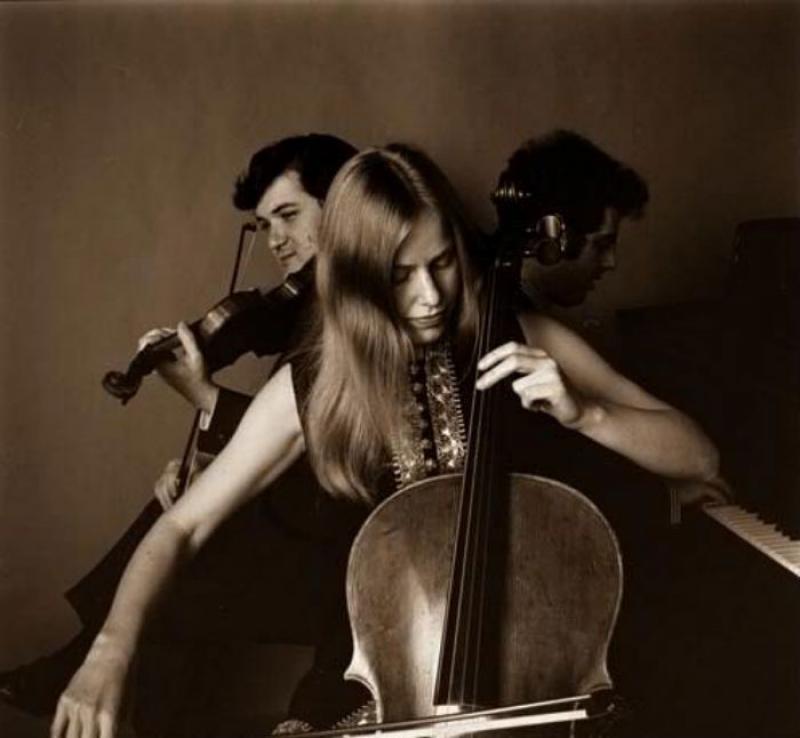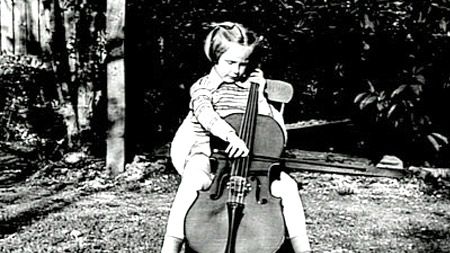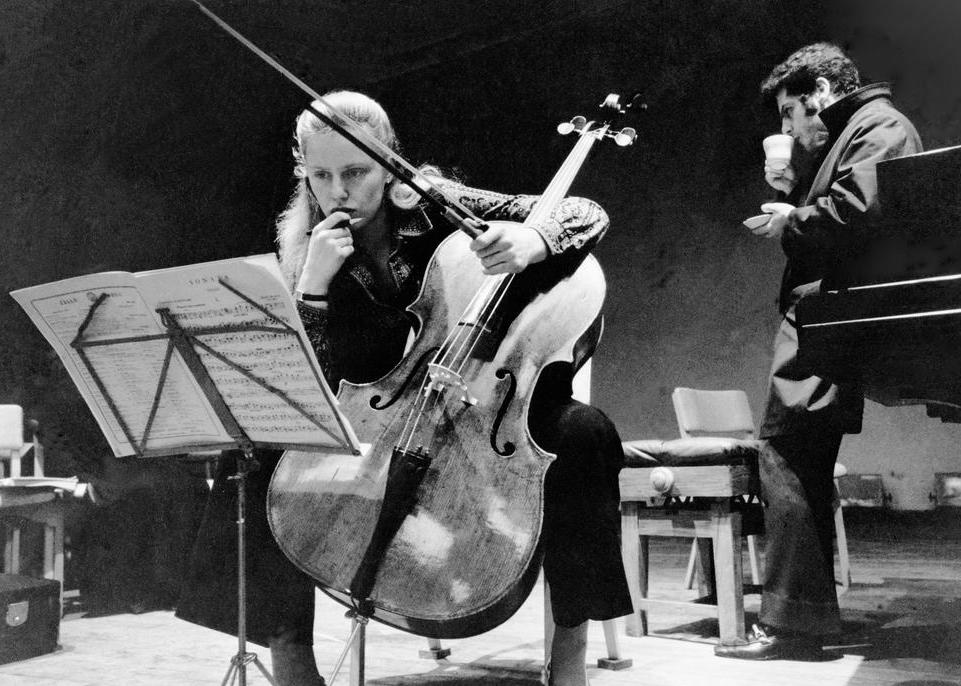Jacqueline du Pré: A Gift Beyond Words, BBC Four review - ode to joyful cellist | reviews, news & interviews
Jacqueline du Pré: A Gift Beyond Words, BBC Four review - ode to joyful cellist
Jacqueline du Pré: A Gift Beyond Words, BBC Four review - ode to joyful cellist
More gush than grit in a greatest-hits compilation from the filmmaker who knew her best

Hyperbole be damned. The most iconic English classical recording was made on 19 August 1965 in Kingsway Hall, London. Like Maria Callas singing Tosca, Jacqueline du Pré simply was the Elgar Cello Concerto once the LP hit the shops in time for Christmas.
Again like Callas, she was a heaven-sent gift for EMI, and not a moment too soon. By 1965 Callas was on the slide – she had ended her stage career the month before the mikes were hung in Kingsway Hall – and would soon be reduced to croaking out back-numbers in recital concerts even her most avid fans wince to recall. Here was another striking rather than beautiful musician in supreme command of her instrument, easy to photograph, possessed of unnerving artistic confidence. That Elgar recording has never left the catalogue since (young genius in the making, pictured below).
 Thirty years have passed since her death from multiple sclerosis, aged just 42. Time for a fresh perspective? Perhaps, but this isn’t it. Ten years older than her, the film-maker Christopher Nupen first met du Pré in the spring of 1961. Having trained a camera on her throughout her career and into its twilight, he is more responsible than anyone for du Pré iconography (that 100-watt smile etched on the memory), her most devout chronicler and keeper of the flame.
Thirty years have passed since her death from multiple sclerosis, aged just 42. Time for a fresh perspective? Perhaps, but this isn’t it. Ten years older than her, the film-maker Christopher Nupen first met du Pré in the spring of 1961. Having trained a camera on her throughout her career and into its twilight, he is more responsible than anyone for du Pré iconography (that 100-watt smile etched on the memory), her most devout chronicler and keeper of the flame.
At least five separate Nupen documentaries have been boiled down to less than an hour. Would you know, if you didn’t know? The title certainly offers a hostage to fortune. The director’s own narrative never gets off its knees. Cut in close sequence, one distinguished friend and colleague (the Venn diagram overlapped almost too perfectly) after another queues up to prove that, yes indeed, the cellist’s gift was beyond words.
A rare musical insight is imparted by du Pré herself. Her teacher William Pleeth "formed the spine of my cello playing," she says in her funny butter-wouldn’t-melt English cut with a Guernsey-native accent. Duets with him – two cellos together make a glorious, bantering sound, like old pals after a good Sunday lunch – are among the highlights of the hour. Pleeth himself gets down to brass tacks. No wonder "anything was possible" with a pupil who, aged 13, would learn, memorise and master a finger-twisting Piatti study and almost half the Elgar concerto within the space of 48 hours.
The spine of A Gift Beyond Words is formed by Nupen’s 2001 documentary, Remembering Jacqueline du Pré. A few years earlier the music establishment had closed ranks when the cellist’s sister and her husband had the temerity to go public with a lurid tale of affairs, tantrums and breakdowns – everyday stuff, it has to be said, behind the scenes of a world populated by (sorry) highly strung individuals, but the resulting Hilary and Jackie film of 1998 scored a success while upsetting, it seemed, almost everyone who knew her (du Pré and Barenboim, pictured below) .
 Nupen claims never to have seen the film, but most of his talking heads surely did. At least, that’s one explanation for the brittle insistence from all concerned upon du Pré’s honesty, kindness, generosity. She was not vain, petty or envious. And I’ll sue anyone who says she was (Daniel Barenboim doesn’t say that, but Hilary and Jackie still can’t be shown in France under legal menaces).
Nupen claims never to have seen the film, but most of his talking heads surely did. At least, that’s one explanation for the brittle insistence from all concerned upon du Pré’s honesty, kindness, generosity. She was not vain, petty or envious. And I’ll sue anyone who says she was (Daniel Barenboim doesn’t say that, but Hilary and Jackie still can’t be shown in France under legal menaces).
Zubin Mehta singles out Nupen’s film of The Trout Quintet as his favourite memory of du Pré – as well he might, having learnt the double-bass for the sole purpose of playing the piece with her. The violinist Itzhak Perlman confesses that she ruined it for him – never could the spirit of those sessions be recaptured with anyone else. If only as an extended invitation to watch and marvel at five young musicians of superabundant gifts, in love with Schubert, with Sixties life and (in some cases) with each other, this tribute has its place.
rating
Buy
Share this article
The future of Arts Journalism
You can stop theartsdesk.com closing!
We urgently need financing to survive. Our fundraising drive has thus far raised £33,000 but we need to reach £100,000 or we will be forced to close. Please contribute here: https://gofund.me/c3f6033d
And if you can forward this information to anyone who might assist, we’d be grateful.

Subscribe to theartsdesk.com
Thank you for continuing to read our work on theartsdesk.com. For unlimited access to every article in its entirety, including our archive of more than 15,000 pieces, we're asking for £5 per month or £40 per year. We feel it's a very good deal, and hope you do too.
To take a subscription now simply click here.
And if you're looking for that extra gift for a friend or family member, why not treat them to a theartsdesk.com gift subscription?
more TV
 The Rise and Fall of Michelle Mone, BBC Two - boom and bust in the lingerie trade
Life in the fast lane with David Cameron's entrepreneurship tsar
The Rise and Fall of Michelle Mone, BBC Two - boom and bust in the lingerie trade
Life in the fast lane with David Cameron's entrepreneurship tsar
 Code of Silence, ITVX review - inventively presented reality of deaf people's experience
Rose Ayling-Ellis maps out her muffled world in a so-so heist caper
Code of Silence, ITVX review - inventively presented reality of deaf people's experience
Rose Ayling-Ellis maps out her muffled world in a so-so heist caper
 The Bombing of Pan Am 103, BBC One review - new dramatisation of the horrific Lockerbie terror attack
Six-part series focuses on the families and friends of the victims
The Bombing of Pan Am 103, BBC One review - new dramatisation of the horrific Lockerbie terror attack
Six-part series focuses on the families and friends of the victims
 theartsdesk Q&A: Zoë Telford on playing a stressed-out psychiatrist in ITV's 'Malpractice'
She nearly became a dancer, but now she's one of TV's most familiar faces
theartsdesk Q&A: Zoë Telford on playing a stressed-out psychiatrist in ITV's 'Malpractice'
She nearly became a dancer, but now she's one of TV's most familiar faces
 The Trunk, Netflix review - stylish, noir-ish Korean drama wrapped around a beguiling love story
Unusual psychological study of a stranger paid to save a toxic marriage
The Trunk, Netflix review - stylish, noir-ish Korean drama wrapped around a beguiling love story
Unusual psychological study of a stranger paid to save a toxic marriage
 Malpractice, ITV1, Series 2 review - fear and loathing in the psychiatric unit
Powerful return of Grace Ofori-Attah's scathing medical drama
Malpractice, ITV1, Series 2 review - fear and loathing in the psychiatric unit
Powerful return of Grace Ofori-Attah's scathing medical drama
 Fake, ITV1 review - be careful what you wish for
Australian drama probes the terrors of middle-aged matchmaking
Fake, ITV1 review - be careful what you wish for
Australian drama probes the terrors of middle-aged matchmaking
 Formula E: Driver, Prime Video review - inside the world's first zero-carbon sport
F1's electric baby brother get its own documentary series
Formula E: Driver, Prime Video review - inside the world's first zero-carbon sport
F1's electric baby brother get its own documentary series
 Flintoff, Disney+ review - tumultuous life and times of the great all-rounder
John Dower's documentary is gritty, gruelling and uplifting
Flintoff, Disney+ review - tumultuous life and times of the great all-rounder
John Dower's documentary is gritty, gruelling and uplifting
 Your Friends & Neighbors, Apple TV+ review - in every dream home a heartache
Jon Hamm finds his best role since 'Mad Men'
Your Friends & Neighbors, Apple TV+ review - in every dream home a heartache
Jon Hamm finds his best role since 'Mad Men'
 MobLand, Paramount+ review - more guns, goons and gangsters from Guy Ritchie
High-powered cast impersonates the larcenous Harrigan dynasty
MobLand, Paramount+ review - more guns, goons and gangsters from Guy Ritchie
High-powered cast impersonates the larcenous Harrigan dynasty
 This City is Ours, BBC One review - civil war rocks family cocaine racket
Terrific cast powers Stephen Butchard's Liverpool drug-ring saga
This City is Ours, BBC One review - civil war rocks family cocaine racket
Terrific cast powers Stephen Butchard's Liverpool drug-ring saga

Add comment